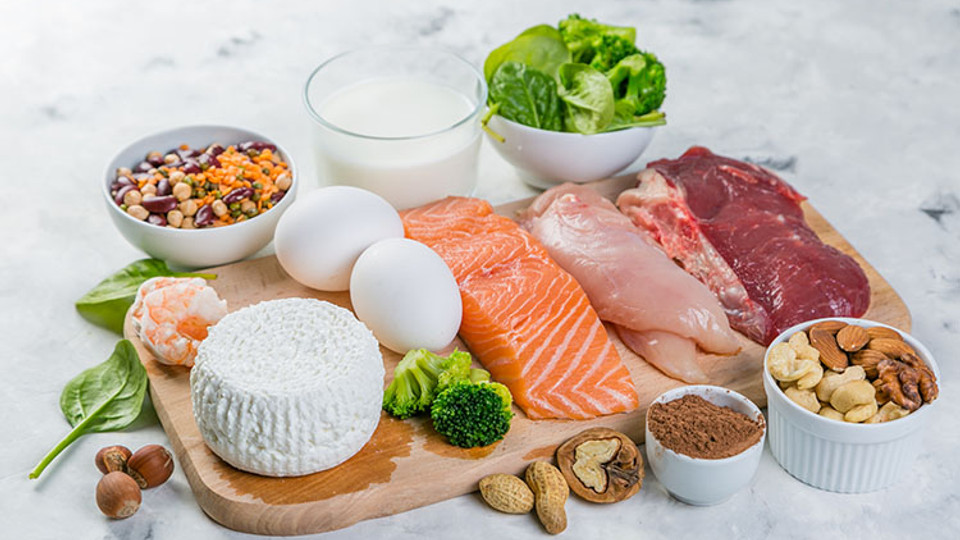
If you’ve read my recent article on the ketogenic diet, you’ll know that low-carb diets in which traditional macronutrient loads are changed and manipulated for a variety of effects are all the rage. However, where the keto diet emphasises fat consumption, many others in the health and fitness industry advocate protein as the main macronutrient of importance.
In this article I’ll run through the reasons why so many fitness buffs are reaching for the protein shakes as I explain high protein diets, their uses, how they work, and how you might set about implementing one yourself.
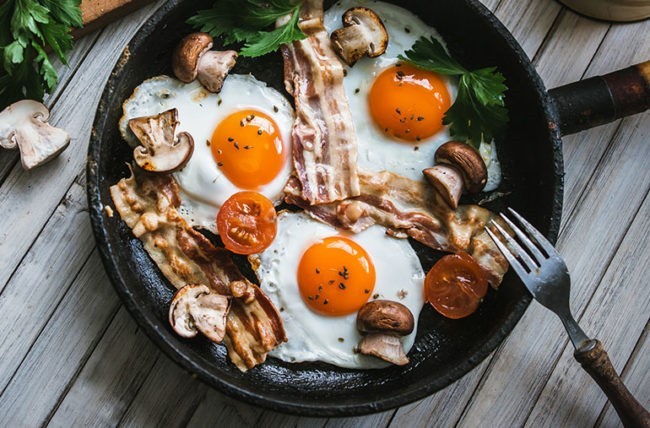
Protein: a brief introduction
What is protein?
Protein is very important: it is a vital component of every cell in the human body. Your body therefore needs protein in order to build and maintain muscles, organs, bones, skin… everything. Protein is what your body uses to repair tissue. Your hair and nails are mainly made from protein. Muscles can only grow with adequate protein intake (more on this below.) Protein is used in creating hormones, enzymes and other chemicals that your body needs in order to function.
Everything in your body needs protein, basically.
Where do you get protein?
Most foods contain at least a little protein. Humans get most of their dietary protein from animal sources such as meat and dairy products, or else from certain plants like nuts, grains, seeds and beans.
There is an important distinction to be made between animal- and plant-based protein. Animal products give us complete proteins– this means that the full range of amino acids (the building blocks of protein) that the body needs are contained in and delivered by animal products. Plant proteins, for the most part, deliver only some amino acids (though, as they all deliver different ones, it’s still very much possible to get a full range of proteins from sufficiently varied plant-based diets.)
Protein’s uses
Protein is one of the three ‘macronutrients’, the other two being fat and carbohydrates. Your body will therefore need a relatively large amount (daily macros are measured in grams, whereas micronutrients like vitamins and minerals are measured in micrograms.)
Protein is different to the other two macronutrients, however. Your body stores fat and carbohydrates easily enough- so easily that these are the two caloric sources whose overindulgence is largely responsible for the current obesity epidemic. Protein cannot be stored: all the protein you need must be taken in fresh supply through your daily diet.
How much protein your body needs will depend on a variety of factors. These include your age, gender, any health issues you might have and, importantly, your activity levels and fitness goals. Most people eat enough protein for a conventional diet: I will shortly be making the case for a higher protein diet, however.

But first, let me demonstrate just how important abundant dietary protein is by looking at seven of the main ways in which your body uses it:
Seven ways in which your body uses protein
- It is used for growth and maintenance: as I mentioned above, your body needs protein in order to grow new, and maintain existing, tissue. As your body doesn’t store protein, you will need to eat protein in adequate supply every day for this to happen. Athletes and those recovering from injuries or surgery will need more protein as the demands their bodies face for tissue repair are greater than normal.
- It can carry messages: some proteins are hormones – the chemical messengers your body produces to facilitate communication between cells, organs and tissue. Proteins and peptides form one of the three main types of hormones, alongside steroids and amines. Examples of protein- and peptide-based hormones include insulin and human growth hormone. Protein is also important for enzyme creation and functioning. Enzymes are proteins that aid the thousands of biochemical reactions that take place within and outside of your cells. Protein can also transport more than just messages: transport proteins are crucial to your body’s healthy functioning and can carry substances through your body, including vital micronutrients, cholesterol and oxygen.
- It gives you structure: Proteins like keratin (of particular note in your skin, hair and nails), collagen and elastin are fibrous and give your cells their rigidity. Collagen is the protein most abundantly found in your body and gives structure to your bones and soft tissue.
- It can give you energy: one gram of protein contains 4 calories of energy. Though carbs and fat are more expendable, more efficiently metabolised energy sources, in a state of fasting, or in the absence of enough carbohydrates, your body enters a state of catabolism. It breaks down skeletal muscle tissue so that the amino acids released can be used for energy.
- It helps in maintaining your body’s pH balance: protein is important for its role in regulating the acidity in your bodily fluids, including blood and bile. Different foods and drinks offer different pH levels and a variety of bodily systems work to balance them out, including protein-based compounds like haemoglobin. Without this balance, your body’s pH levels could alter, bringing about some potentially very nasty health risks.
- It keeps fluid levels in check: proteins like albumin and globulin in your blood help to maintain your body’s fluid levels by retaining water. A lack of appropriate amounts of protein will see albumin and globulin levels decrease, leading to fluid build ups that come with health complications like edema. If you’ve ever seen pictures of people in starving regions with distended, swollen bellies, this is likely the reason: they may be unable to meet a healthy protein intake and suffer from a condition called kwashiorkor as a result.
- It keeps your immune system healthy: antibodies are made from protein. They protect against harmful contagions like bacteria and viruses. Without adequate protein, the amounts of antibodies you produce will fall, leaving you open to infection.
High protein diets
So far, we’ve been talking in quite loose terms about ‘adequate’ protein intake, but what does this mean? For most people, around 50g per day should suffice, or about 0.8g for every kilogram of bodyweight. This amount is easily met. However, in this article we’re dealing with high protein diets- the kind that I and many other gym enthusiasts follow.
People looking to either lose weight or increase hypertrophy (muscle growth, usually through resistance training exercise) often follow a high protein diet.
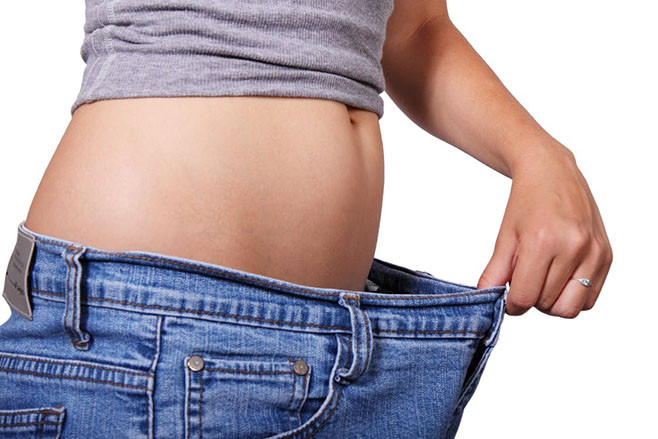
Losing weight
Protein takes a while for your body to break down, unlike simpler carbs, and so it increases feelings of satiation from eating. Typically, therefore, high protein diets allow you to eat fewer carbs and overall calories, leading to an easy to maintain caloric deficit. A 500-calorie daily deficit will allow you to lose approximately 0.5kg/1lb per week, so this is of great benefit to those looking to lose weight or remain lean during training.
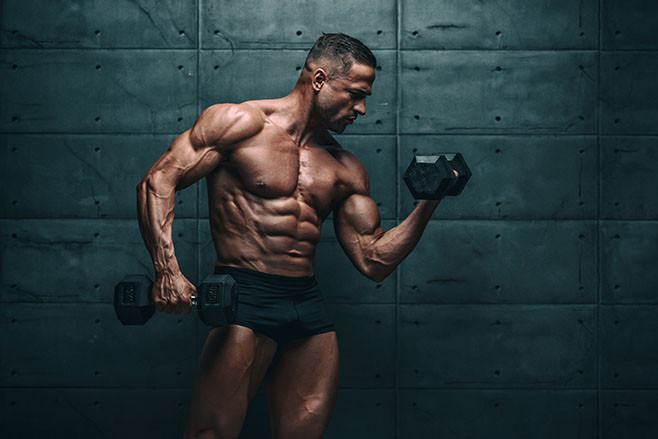
Hitting hypertrophy
Increased protein intake has also been linked with a greater degree of hypertrophy, with those looking to build muscle through resistance training like weight lifting or building often eating three times the normal recommended protein intake, or often more. To put this in perspective, I typically eat 170-210g per day, depending on my training needs (my more demanding days often see the higher end of this range.) This allows me to recover from hard weight lifting and enables me to build muscle. Any less than that 170g lower end and fatigue creeps in; I recover slower, have less energy and my strength diminishes.
High protein diets will generally make room for the added protein intake by keeping carbohydrate intake low. Most people will therefore make use of higher protein and lower carb food sources such as:
- Lean meat and oily fish
- Dairy products
- Eggs
- Higher protein vegetables like spinach and peas
- Beans and legumes
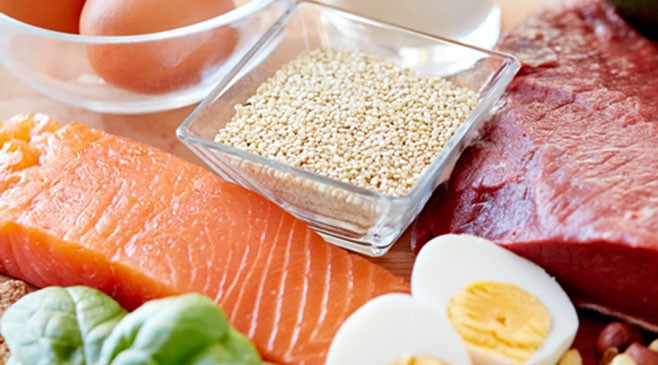
As a vegetarian on a high protein diet, my morning meals usually consist of beans on toast (a British classic) followed by a midmorning whey protein shake- 70-80g of protein in before lunch! I also typically eat about 4-6 eggs per day in the form of omelettes, frittatas, scrambled eggs, high protein pancakes, sometimes even drinking them raw… you learn to get quite versatile.
Aside from breakfast, and fruit and veg throughout the day, I try to keep my carb intake modest. Of course, I eat the odd slice of cake, and go out for pizza sometimes, but for the most part I keep these kinds of foods out of my diet.
A cursory glance online will acquaint you with some quite high-profile high protein diet plans. The Atkins diet is the one most people commonly think of. However, I follow none of these: I simply work the numbers to keep my protein high and everything else where it needs to be. You can do this all on your own, without any fancy meal plan, as I’ll go into below.
But why would you do all this? We’ve seen the benefits that protein can bring, but why do I go so extreme in my intake?
The benefits of a high protein diet
- The satiation experienced, alongside the reduced carb and total calorie intakes, makes high-protein diets perfect for those looking to lose weight. I have trained hundreds of clients through their weight loss journeys, and almost all of them have been on the kind of diet I have outlined here. Success has always been a matter of time, and I have managed to help almost everybody to lose weight.
- Given the maintenance and repair of body tissue that protein is primarily used for, those undergoing heavy physical stress (i.e. athletes, bodybuilders and their ilk) benefit from increased amounts. As I mentioned above, triple the average recommended amount is quite a common protein intake for bodybuilders and strength athletes.
- The benefits of protein, as laid out above, cannot be overstated. If you want your body functioning on full, with enzymes and hormones performing their actions well, pH levels balanced, full bone and soft tissue repair in effect, and so forth, protein is a must. The more the merrier.
- A varied diet, and one that makes the most of animal products, will give you a full complement of amino acids, including the essential ones. Although I don’t eat meat, I get a full range from eggs and dairy. I’ve even trained vegans to great effect before, on high protein diets- rice and lentils are a combo that make up a complete protein dose, for instance, whilst soy and pea protein shakes provide plenty of volume.
The scientific consensus on the high protein diet
Balance is key, always. There has been a lot of research undertaken on high-protein diets, looking both at weight loss and hypertrophy/athletic performance. Though the long-term effects of higher-protein diets need more data and study before any conclusion can be met, we can begin to build a picture of the short term.
Higher protein levels aid in weight loss and hypertrophy. However, as I’ll go into in more detail below, it has been suggested that there could be some health problems associated with this kind of increased protein intake.
Principally, higher acid levels from such a large amount of daily protein could have adverse effects on the kidneys and overall digestive health.
In addition, for those who take their protein from fatty animal sources, heart issues can be common. For those who cut down on carbs too severely, malnutrition and poor brain activity can result.

My interpretation is to repeat, and keep repeating, that balance is key. Don’t take a high-protein diet as carte blanche to eat tons of fatty steak and eggs. Take your protein from varied sources, including vegetables and whey protein shakes and other supplements in which there is zero fat. Don’t cut your carbs too much: get those beans and pulses in to bolster your fibre intake even as you up your protein.
Follow this, keep it sensible, and you should benefit greatly from a high-protein diet.
How to work out your protein needs, and how to fill in the rest of your macros
In order to fulfil a high protein diet, there are some figures that you will need to know. The most important element is working out how much protein you need, obviously, alongside the amounts of carbohydrate and fat that will also go into your diet plan.
Working out your caloric needs
The following is the way I would suggest working out a high protein diet for yourself, though there are others. All will require you to know your basal metabolic rate (BMR.) You can work this out very easily using an online BMR calculator. Once you have your BMR, you will be able to convert your caloric needs into macronutrient requirements.
I’ll use my own biometrics and nutritional needs as an example. I weigh 95kg (210lbs.) I’m very active, which converts my BMR upwards to about 3,580 calories per day. This will enable me to maintain my current weight.
If I was looking to lose weight- let’s say 1kg per week- I would need to keep to a daily deficit of about 1000 calories, giving me roughly 2,500 calories per day. On a high protein diet, most of this deficit would come from eliminating carbs, though some would be from fat. As few calories as possible would be taken from protein.
But, for the sake of argument, let’s say I want to eat at maintenance. What are my macronutrient demands based on the above caloric demands?
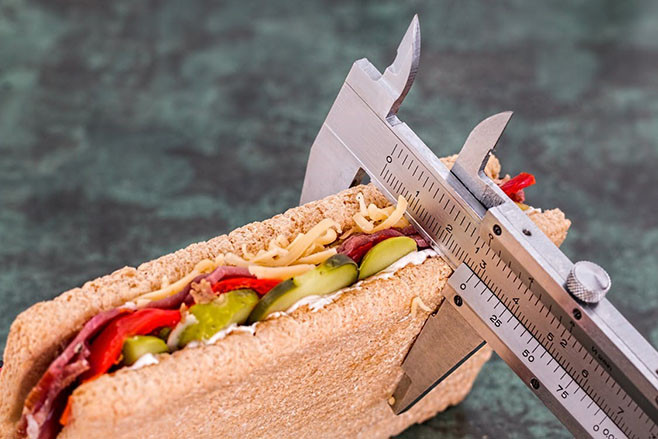
Your macronutrient needs on a high protein diet
Using the above numbers, for my own biometrics and activity levels in a state of maintenance, I can break down the calories between protein, fat and carbs to work out how many of each I should be eating.
- You will need to begin by multiplying your own bodyweight in kilograms by between 2. This will give you a rough estimate of your protein needs in grams. If you find yourself putting weight on, try dropping the multiplier. If you find your strength and muscle gains depleting, or you are getting hungry a lot, bring it up a bit. I typically eat 1.8-2.2g of protein per kilogram of body per day, giving me the aforementioned 170-210g.
- Using 190 as my average, I can multiply this by the caloric load of each gram of protein (4) to get 760 calories. Therefore, about 760 of my daily 3,580 calories come from protein.
- This leaves me to split the remaining 2,820 calories between carbs, also 4 calories per gram, and fat, at 9 calories per gram. If you live a quite sedentary lifestyle, I would suggest taking fewer of the remaining calories from carbs. If you are active, more carbs may be more appropriate. A good split for me could look something like 400g of carbs (1600 calories) and 135g of fat (1215 calories.)
If I want to lose that kilogram per week, I would want to eat more like 190g of protein (760 calories), 210g of carbs (840 calories) and 100g of fat (900 calories).
You can also keep it flexible if you don’t struggle with weight and don’t want to spend your life counting macros. As long as I eat the 190ish grams of protein laid out above, the rest of my diet can contain as much or little of anything else as naturally happens.
A typical day’s eating on a high protein diet
A day’s meals can be varied, fun, tasty and healthy on this kind of eating plan. Supplementation will play a big part- anybody on this kind of diet will tell you how much they rely on protein shakes. But your regular meals will be just as important. Below, I show you how to hit your protein targets whilst taking in adequate amounts of healthy fat and carbs:
| Breakfast | Beans | Toast with butter | Small glass of orange juice |
|---|---|---|---|
| Mid-morning snack | Banana | 3 scoops of whey protein in 50:50 water and milk | Coffee with cream |
| Lunch | Chicken breast fillet | Roasted peppers with cottage cheese filling | Salad of lettuce, onion, and olive oil dressing |
| Afternoon snack | Skyr yoghurt with berries and honey | 1 scoop of whey protein in 50:50 water and milk | Black coffee |
| Dinner | Omelette with 2 full eggs and 3 egg whites | Sweet potato fries | Peas, spinach and asparagus with mayonnaise |
Obviously, quantities of some of the above can vary (do you take 10 or 30 grams of yoghurt, and how big is a scoop…?) but on my calculations, this can give you anything from approximately 160-210g of protein in a healthy, enjoyable way.
Pros and cons of a high protein diet
I hope it’s clear by now how I feel about high protein diets: I am very heavily in favour of them and follow a version myself. However, high protein diets are not all sunshine and rainbows, and some people really don’t like them.
Let me shed some light on the reasons that some people steer clear of high protein diets, with a list of common cons of following them:
Cons of going high protein:
- It can be pricey. Although protein shakes are cheap, actual, whole foods that are high in protein are not. The reason carbs are so ubiquitous is because they are cheap and plentiful- less so chicken breast, steak and nuts.
- It is environmentally unsound. Much of the data now points to livestock rearing as one of the leading causes of environmental damage. If you eat a meat-rich diet, you could be leaving a much larger carbon footprint than is normal.
- You may get an upset stomach. Ask anybody who’s been on this kind of diet for a while: they will be windy at times, with perhaps a slight amount of recurring IBS. So I’ve heard, anyway…
- Or you could get very bunged up. The lack of fibre that many following a high protein diet consume can cause constipation. Always make sure that you take as many of the carbs that you do eat as possible in the form of good quality fibre.
- If eating more protein means eating fewer carbs, you will be missing out: these carbs contain many vital micronutrients that our bodies need. I would always recommend taking a decent, all-purpose multi-vitamin supplement on this kind of diet.
- It puts a lot of strain on your renal system. Your kidneys may not be too happy about the increased workload a high protein diet will give them.
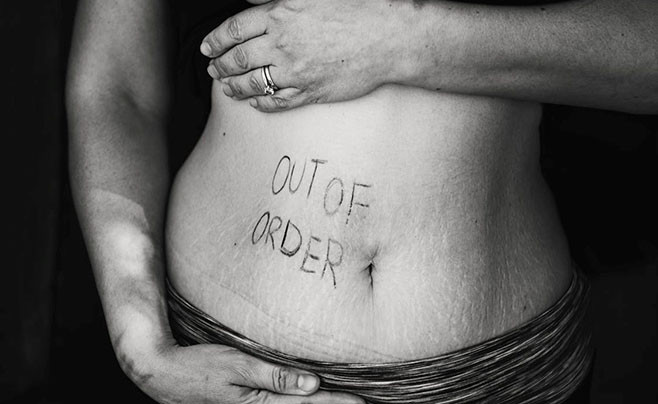
Who should make use of high protein diets (and who shouldn’t)?
Who should go high protein:
People like me should make use of a high protein diet! If you lead an active lifestyle, and have at least half an eye on hypertrophy, a diet like this will be the only one that will allow you to reach your goals. Hypertrophy only occurs where your body has excess protein and you need to constantly feed your muscles and soft tissue mass so that everything recovers as it should.
If you want to lose weight and are in any way intolerant of carbs, or just don’t burn through them very well so that they turn into fatty tissue, this kind of diet will help you to reach your goals. Lacking that constant, high carb energy input will put you into the caloric deficit you need, whilst having a large amount of protein will lead to satiation and will help you to retain muscle mass as your body fasts. You will also likely see a decrease in insulin spikes as slower digesting proteins take the place of simple carbs: symptoms of prediabetes and obesity can be greatly mitigated by a higher protein diet.
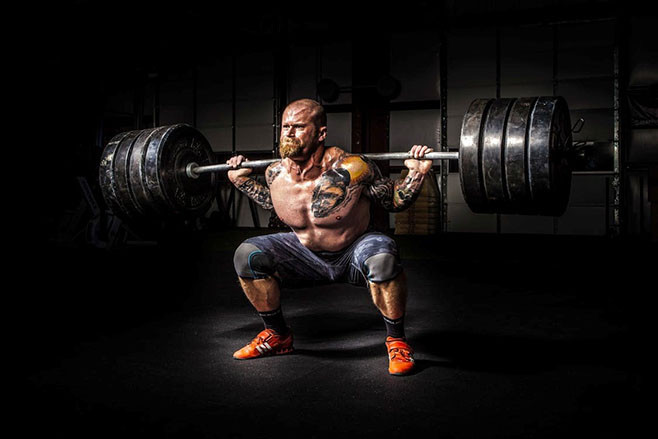
Who shouldn’t go high protein:
You should always consult a qualified, competent physician before embarking on any new diet. If your doctor raises concerns about your kidney health, or any other digestive concerns, there is a good chance that they will warn you off a high protein diet. Heed their advice: not everybody’s kidneys can cope with the added stress of all that protein.
If you function well on carbs (despite what popular, current trends say, some people really can do well on carbs) then use them to your advantage. Always get to know your body and eat what it needs: if 500g of carbs per day works for you and allows you to hit your goals, go with it.
Finally, if you’re an endurance athlete, you need plenty of fat and protein. However, you also need a lot of carbs to keep you going during training. Eat a more even ratio, with perhaps fewer of calories coming from protein and more of your calories coming from carbs. A good target for protein here might be more like a daily 1.2-1.4 grams for every kilogram of your bodyweight.
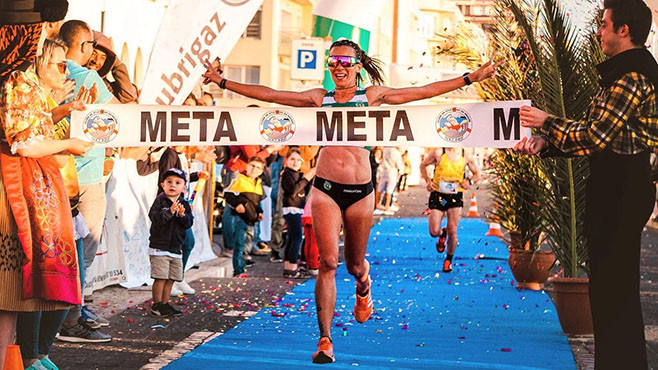
Outro: my final thoughts
I have been eating a high protein diet for many years and rarely suffer any of the side effects related to it. It’s also cheap: as a vegetarian, though variation can be an issue, I have no expensive meat products in my diet. A couple of protein shakes per day and some well-designed meal plans makes for a healthy, rounded, relatively cheap diet all told.
I’m also quite strong and am getting stronger all the time. This isn’t a boast: I lift heavy weights, then I go home and eat plenty of protein. It’s simple and it works well.
However, there are some people for whom a high protein diet is less worthwhile, as mentioned above. There are also many people who will do it wrong, or who will do it very expensively: please take on board everything I’ve laid out above, and this should hopefully now not be you! You have the recipe for success: go out, give it a go, and watch as your body transforms.



